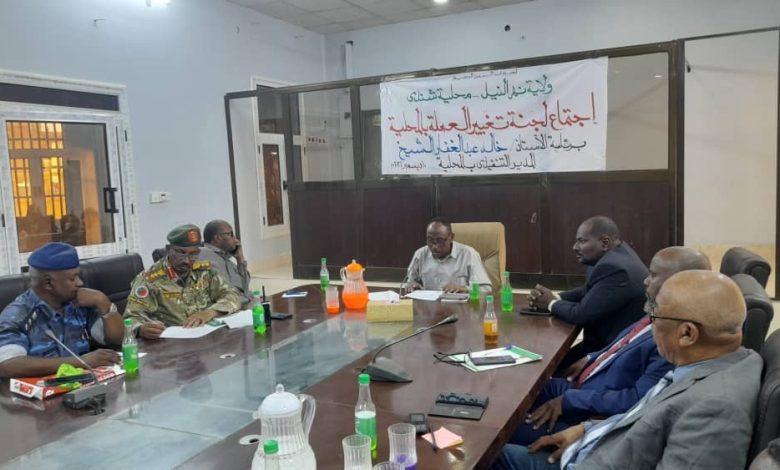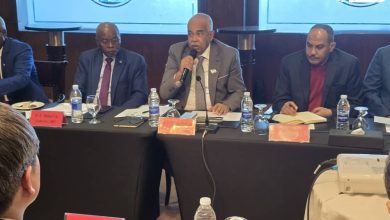Economic
Currency Exchange in Shendi: Directives to Facilitate Procedures

Shendi – Rehab Abdullah
The Executive Director of Shendi Locality and Head of the Currency Exchange Committee, Khaled Abdel-Ghafar, has instructed the banks operating in the locality to facilitate the exchange process and deposit customer funds into the banking system. He also emphasized the need to open additional counters in coordination with security agencies.
Monitoring Bank Accounts
During a meeting on Tuesday, which included the managers of the banks, the Director of Intelligence, the Police Director of Shendi, the Civil Registry representative, the Auditor General’s representative, the Operations Manager of the Third Infantry Division, and the Director of Military Intelligence, Khaled emphasized the necessity of implementing necessary precautionary measures. He also called for increased media coverage to raise public awareness about the currency exchange process, explaining it in simple terms. He clarified that the exchange process is done via deposits into bank accounts and considered it an opportunity for banks to increase their customer base. He also stressed monitoring bank accounts to prevent the deposit of suspicious money, with verification by security authorities.
Looted Funds
The Director of Shendi’s General Intelligence, Colonel Ahmed Farah, stressed the importance of adhering to the guidelines of the Central Bank of Sudan and the Supreme Currency Exchange Committee. He pointed out that a significant amount of cash was looted from homes, which could pose a major security issue. He called for precautionary measures regarding large sums of money, even from trusted sources, and urged banks to facilitate the opening of accounts and deposits smoothly, with proper guidance, and to ensure confidence in daily withdrawals. He also anticipated market sales, stressing the need for a solid economic security plan. He emphasized accountability without burdening citizens, stating that the 13-day deadline for the exchange was set with a specific objective, and he expected a significant influx of currency in the locality due to the large number of displaced people. He also encouraged the Civil Registry to reduce the fees for issuing national IDs and simplify the procedures to reduce economic disparities.
Threats and Precautions
The Police Director of Shendi Locality, Brigadier General Az El-Din Mohamed Idris, emphasized the importance of securing Shendi’s unique geographic position, being on the border with Khartoum State. He explained that a month-long security plan had been put in place to prevent the currency from being leaked to hostile areas or militia-controlled zones. Among the threats was the potential smuggling of money through fuel tankers. He confirmed the readiness of police forces and all law enforcement agencies, with presence at checkpoints, crossings, and entry points, and a backup force in place to handle any disturbances.
Search for Suspicious Funds
Colonel Mustafa Taj El-Sir, head of the Intelligence Department, affirmed the authorities’ right to search any premises for suspicious funds. He also predicted the arrival of counterfeit money. Colonel Gabriel Madawi, head of the Operations Department, reassured that the security plan was well implemented, highlighting their success in securing the locality against militia members, and stated they would not tolerate the entry of suspicious funds or the smuggling of new currency out of the area.
Weak Currency Deposit
Several bank managers reported weak deposits on the first day of the exchange process. They noted that they had received the 1000-pound banknotes but had not yet received the 500-pound notes.
Yasser Al-Jumri, manager of the Shendi Savings Bank, explained that the true purpose of the currency exchange by the Central Bank of Sudan was to bring in the currency mass. He mentioned that the Central Bank allowed a daily withdrawal limit of 200,000 pounds and that they would start issuing 100 and 200-pound notes to customers. He also stated they would accept any deposit other than the 1000-pound and 500-pound denominations and that there was an agreement to send the exchanged denominations to the Central Bank for them to provide new currency in return. He confirmed there were no risks associated with reducing the circulating cash volume, stating that this would align them closer with the global system, as the Central Bank had instructed all banks to implement applications for cash volume ratios of 30-40%.
Filing Reports
Al-Jumri anticipated potential risks related to counterfeit currency being introduced and appreciated the presence of security agencies to monitor the exchange process. He confirmed that reports would be filed if any counterfeiting was discovered and warned against opening new exchange windows to prevent exploitation by dishonest individuals. He recommended that the committee conduct an official visit to the bank to document the cash receipt process, customer reception, and to report the volume of currency withdrawn from Shendi.
Stolen Money
The Manager of Omdurman National Bank in Shendi Locality predicted the entry of stolen funds or funds belonging to militias, which would require strict security measures. He also mentioned that the process of transferring cash to Atbara would require additional security. He revealed that banking applications were being activated.
Weak Media Campaign
Mergani Abdel-Rahman, a representative of Faisal Islamic Bank, criticized the weak media campaign for the currency exchange process. He stressed the need to educate the public on how the exchange works, emphasizing that it involves depositing money, opening accounts, and using banking applications. He pointed out that some customers objected to the withdrawal limits, especially those who receive salaries, and noted a lack of sufficient cash distribution during the morning, with congestion occurring in the afternoon.
Anticipated Congestion
Ahmed Omarabi, the manager of Nilein Bank in Shendi Locality, predicted public congestion on the second day of the exchange (Wednesday), based on previous exchange experiences, and noted that arrangements would need to be made accordingly.
Public Awareness
Bokri Al-Azraq, Director of Culture, Media, and Communications in Shendi Locality, announced that his department had proactively prepared for the currency exchange process with a daily media campaign to inform citizens about the exchange period, how to open accounts, and to clarify that the exchange of 500 and 1000-pound notes is done through deposits. He mentioned that daily announcements were being made through local electronic newspapers and that all platforms were being used to explain the importance of the exchange. He acknowledged the role of the radio due to its wide reach and promised to increase media coverage.



